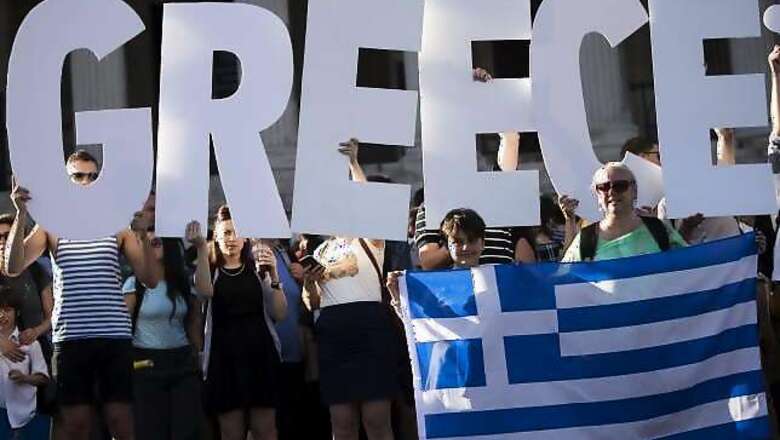
views
Athens/Brussels: Greece was appealing to its euro zone partners and the European Central Bank on Wednesday to keep it afloat after defaulting on its debt to the International Monetary Fund and losing frozen international bailout money.
Athens was due to put new proposals for a two-year loan agreement and a debt rescheduling to Eurogroup finance ministers after hinting that leftist Prime Minister Alexis Tsipras might be willing to scrap a referendum on bailout terms.
Finance Minister Yanis Varoufakis told colleagues the ruling Syriza party might even urge Greeks to vote "yes" in Sunday's plebiscite if Athens is granted a loan, participants said.
An opinion poll published on Wednesday showed the "no" camp in the lead after Tsipras urged voters to reject conditions he called humiliating, but it also showed the gap had narrowed after the government had to shut the banks and impose capital controls.
European Commission President Jean-Claude Juncker was engaged in intensive efforts to persuade the leftist Greek government to accept reform commitments close to those it rejected last week to avert an economic meltdown and possible exit from the euro zone.
The Eurogroup is due to hold a conference call at 1530 GMT on Wednesdsay.
However, there is deep scepticism among Greece's partners about any rushed deal to lend more money to a country that on Tuesday became the first advanced economy ever to default on the IMF, missing a 1.5 billion euro debt repayment.
In Germany, Greece's biggest creditor, a senior lawmaker in Chancellor Angela Merkel's conservative bloc accused Greece of misleading Europe and said it would be wrong to grant a loan now.
"All interim measures without conditionality, without reforms are not serious and no basis for talks," Hans Michelbach of the Bavarian Christian Social Union told Deutschlandfunk radio. "We should not go along with this deliberate game to sow confusion being played by the Greeks... Europeans should not be led up the garden path."
French Finance Minister Michel Sapin, who has been Greece's strongest sympathiser in the euro zone, told RTL radio: "The aim is to find an agreement before the referendum if possible... But it's dreadfully complicated."
"It isn't the Germans who are the toughest. It's the little countries that have made big sacrifices in recent years which are saying 'don't ask my people to help you again when my standard of living is lower than yours'," he said.
ECB UNDER PRESSURE
The ECB's policymaking governing council was to meet in Frankfurt to decide whether to maintain, increase or curtail emergency lending that is keeping Greek banks afloat despite a wave of deposit withdrawals and the state's default.
Germany's Bundesbank was leading hawks who argue that the ECB cannot go on providing funds through the Greek central bank as before to lenders that are backed by an insolvent sovereign.




















Comments
0 comment